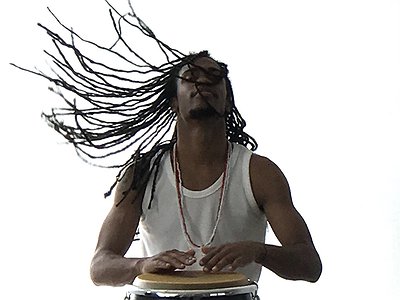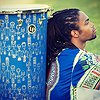Could you describe your creative process on the basis of a piece or album that's particularly dear to you, please? Where did the ideas come from, how were they transformed in your mind, what did you start with and how do you refine these beginnings into the finished work of art?
For the Album “Inike Baba” which was recorded live in Guinea West Africa. I often started with an idea in my head. I might even do voice memos of me singing certain parts or phrases. From there I tried to imagine what all that sounds like out loud on the actual instruments. Once we rehearse I can hear and embellish the music from there. I often find that the more you use your imagination, then when you get that music out of your head, and listen back, that you always achieve amazing results. I listen to lots of music so my inspiration comes from quite a few sources. But I come with an idea, and I build as the vibrations, and spirit inspire me. Finally for this particular project I went to a few elders, and shared a listening with them. And after getting their blessings, I felt that the music was ready for release.
There are many descriptions of the ideal state of mind for being creative. What is it like for you? What supports this ideal state of mind and what are distractions? Are there strategies to enter into this state more easily?
I feel that the ideal state of mind, is peace of self. I feel that although social media can be informative at times, it’s usually a distraction for me. I rather be fully in a sound booth or with the music in my head, and the only images should connect or inspire what I’m creating. I don’t need any substances to get me creative. I just need the music. I try to strategize my flow ahead of time. So I read, and often I’ll find quotes that relate to the work. I have this trick that never fails, I’ll take a book and before I open it, I ask my ancestors to show me a sign or guidance. Then I open to a random page. I feel like the messages I receive from that always connects to the work. I also believe that art should reflect the times, so I stay informed and research the current events from which I can reflect in the music.
How do you make use of technology? In terms of the feedback mechanism between technology and creativity, what do humans excel at, what do machines excel at?
As far as recording, especially today there are several music production recording programs, and software. It’s much easier to be in a home studio, or to be a producer. Where before you had to have access to a studio, or engineer to navigate your project. Now you can simply spend a few bills and create more easily at home, where you can spend hours learning programs and creating, refining your music. I think this has pros and cons. It’s absolutely nice to be able to have access to recording programs, but some producers are far more gifted then others. And not all have the technology that is available today. I feel like this has affected the music industry. Lots of the music is starting to sound the same, not just from trends but also sonically. There is a big difference between musicians, and producers. Also between real instruments, and software instruments.
Collaborations can take on many forms. What role do they play in your approach and what are your preferred ways of engaging with other creatives through playing together or just talking about ideas?
When you have no ego, and are constantly encouraging, and supporting each other, then you can grow together imaginatively. In music there is no such thing as a bad note. It’s about what you do with it. So ideas should be explored. I also like to shine light on the strong qualities that other musicians have. And acknowledge their strength in the music. This way we bring out the best in each other.
How is playing live and writing music in the studio connected? What do you achieve and draw from each experience personally? How do you see the relationship between improvisation and composition in this regard?
Playing live is raw. You are getting me in full inspiration mood. I also like how back in the day, musicians would go in the studio, and were required to execute passes with fewer than 3-5 mistakes. This was due to recording on tape deck which gave less room for fixing errors. So you had to go in the studio, and shred your records solid. This makes us stronger musicians. So, of course, live you can do the same and better. Improvisation is where the soul expresses itself. Mozart was known to be the most amazing improvisor pianist. So I look at the composition as the story that’s being told. But every story has a different way of being expressed. That’s where the soul, and the journey meet.
How do you see the relationship between the 'sound' aspects of music and the 'composition' aspects? How do you work with sound and timbre to meet certain production ideas and in which way can certain sounds already take on compositional qualities?
Sound has emotion. I also like to imagine colors of sound, which also have emotion. So there is a direct connection between the music and the emotion from the story that is being told.
Our sense of hearing shares intriguing connections to other senses. From your experience, what are some of the most inspiring overlaps between different senses - and what do they tell us about the way our senses work? What happens to sound at its outermost borders?
I often close my eyes when I hear music to receive the feeling, and get a sense of how it makes me feel emotionally. As the music carries an emotion, we create our own emotions from how the textures make us feel inside. I get in tune with this particularly when I close my eyes.
Art can be a purpose in its own right, but it can also directly feed back into everyday life, take on a social and political role and lead to more engagement. Can you describe your approach to art and being an artist?
Art to me must reflect the times. And I believe it’s the artist’s duty to create and speak on the things that currently connect us all. There is a beautiful quote “Artists are the gatekeepers of truth. We are civilization’s anchor. We are the compass for humanity’s conscience.” Harry Belafonte. So I feel it necessary to create within a construct that feeds people with timely truth, imagination, wisdom, and also heals.
It is remarkable, in a way, that we have arrived in the 21stcentury with the basic concept of music and performance still intact. Do you have a vision of music and performance, an idea of what they could be beyond their current form?
I feel that music and performance are always evolving. One thing inspires another. I see music carrying stories and messages through ages of time. It always survives because it’s a spirit. And the spirit of the music, like water flows self-corrected. It’s the voice of our Ancestors. In certain periods like now, it goes through a renaissance. And performances will evolve like the imagination. Many messengers will be called, and art will create itself, like it always has.



